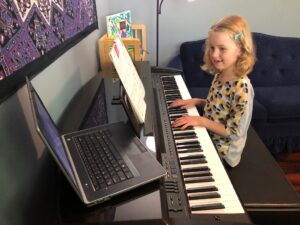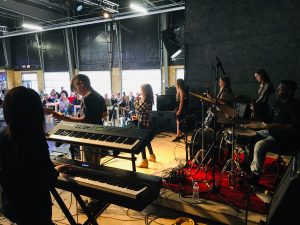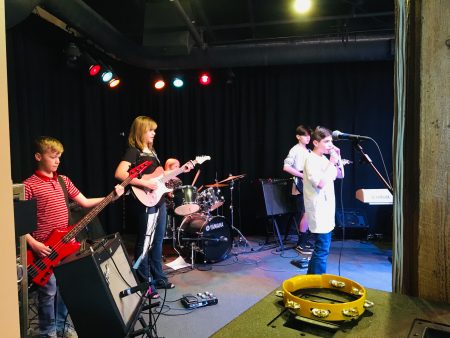Why Take Lessons?
Researchers at the University of Montreal used various brain imaging techniques to investigate brain activity during musical tasks and found that sight-reading musical scores and playing music both activate regions in all four of the cortex’s lobes; and that parts of the cerebellum are also activated during those tasks.
Sergent, J., Zuck, E., Tenial, S., and MacDonall, B. (1992). Distributed Neural Network Underlying Musical Sight Reading and Keyboard Performance. Science, 257, 106-109.
Researchers in Leipzig found that brain scans of musicians showed larger planum temporale (a brain region related to some reading skills) than those of non-musicians. They also found that the musicians had a thicker corpus callosum (the bundle of nerve fibers that connects the two halves of the brain) than those of non-musicians, especially for those who had begun their training before the age of seven.
Schlaug, G., Jancke, L., Huang, Y., and Steinmetz, H. (1994). In Vivo Morphometry of Interhem Ispheric Assymetry and Connectivity in Musicians. In I. Deliege (Ed.), Proceedings of the 3d international conference for music perception and cognition (pp. 417-418). Liege, Belgium.
A University of California (Irvine) study showed that after eight months of keyboard lessons, preschoolers showed a 46% boost in their spatial reasoning IQ.
Rauscher, Shaw, Levine, Ky and Wright. Music and Spatial Task Performance: A Causal Relationship. University of California, Irvine, 1994
In a study conducted by Dr. Timo Krings, pianists and non-musicians of the same age and sex were required to perform complex sequences of finger movements. Their brains were scanned using a technique called “functional magnetic resource imaging” (fMRI) which detects the activity levels of brain cells. The non-musicians were able to make the movements as correctly as the pianists, but less activity was detected in the pianists’ brains. Thus, compared to non-musicians, the brains of pianists are more efficient at making skilled movements. These findings show that musical training can enhance brain function.
Weinberger, Norm. The Impact of Arts on Learning. MuSICa Research Notes 7, no. 2 (Spring 2000). Reporting on Krings, Timo et al. Cortical Activation Patterns during Complex Motor Tasks in Piano Players and Control Subjects. A Functional Magnetic Resonance Imaging Study. Neuroscience Letters 278, no. 3 (2000): 189-93.
In a 2000 survey, 73 percent of respondents agree that teens who play an instrument are less likely to have discipline problems.
Americans Love Making Music – And Value Music Education More Highly Than Ever. American Music Conference, 2000.
Students who can perform complex rhythms can also make faster and more precise corrections in many academic and physical situations, according to the Center for Timing, Coordination, and Motor Skills.
Rhythm Seen As Key To Music’s Evolutionary Role In Human Intellectual Development. Center for Timing, Coordination, and Motor Skills, 2000.
A ten-year study indicates that students who study music achieve higher test scores, regardless of socioeconomic background.
Dr. James Catterall, UCLA
Students who are rhythmically skilled also tend to better plan, sequence, and coordinate actions in their daily lives.
Cassily Column. TCAMS Professional Resource Center, 2000.
In a 1999 Columbia University study, students in the arts are found to be more cooperative with teachers and peers, more self-confident, and better able to express their ideas. These benefits exist across socioeconomic levels.
The Arts Education Partnership, 1999.
College admissions officers continue to cite participation in music as an important factor in making admissions decisions. They claim that music participation demonstrates time management, creativity, expression, and open-mindedness.
Carl Hartman. Arts May Improve Students’ Grades. The Associated Press, October, 1999.
The musician is constantly adjusting decisions on tempo, tone, style, rhythm, phrasing, and feeling–training the brain to become incredibly good at organizing and conducting numerous activities at once. Dedicated practice of this orchestration can have a great payoff for lifelong attentional skills, intelligence, and an ability for self-knowledge and expression.
Ratey John J., MD. A User’s Guide to the Brain. New York: Pantheon Books, 2001.
A research team exploring the link between music and intelligence reported that music training is far superior to computer instruction in dramatically enhancing children’s abstract reasoning skills, the skills necessary for learning math and science.
Shaw, Rauscher, Levine, Wright, Dennis and Newcomb. Music training causes long-term enhancement of preschool children’s spatial-temporal reasoning. Neurological Research, Vol. 19, February 1997
Music making makes the elderly healthier…. There were significant decreases in anxiety, depression, and loneliness following keyboard lessons. These are factors that are critical in coping with stress, stimulating the immune system, and in improved health. Results also show significant increases in human growth hormones following the same group keyboard lessons. (Human growth hormone is implicated in aches and pains.)
Dr. Frederick Tims, reported in AMC Music News, June 2, 1999





